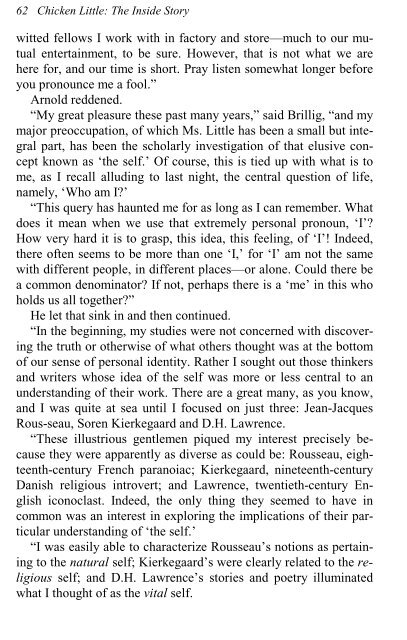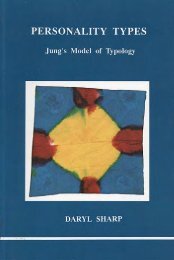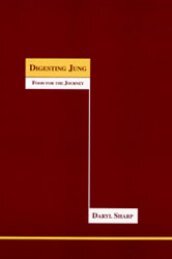Chicken Little: The Inside Story (A Jungian ... - Inner City Books
Chicken Little: The Inside Story (A Jungian ... - Inner City Books
Chicken Little: The Inside Story (A Jungian ... - Inner City Books
Create successful ePaper yourself
Turn your PDF publications into a flip-book with our unique Google optimized e-Paper software.
62 <strong>Chicken</strong> <strong>Little</strong>: <strong>The</strong> <strong>Inside</strong> <strong>Story</strong><br />
witted fellows I work with in factory and store—much to our mutual<br />
entertainment, to be sure. However, that is not what we are<br />
here for, and our time is short. Pray listen somewhat longer before<br />
you pronounce me a fool.”<br />
Arnold reddened.<br />
“My great pleasure these past many years,” said Brillig, “and my<br />
major preoccupation, of which Ms. <strong>Little</strong> has been a small but integral<br />
part, has been the scholarly investigation of that elusive concept<br />
known as ‘the self.’ Of course, this is tied up with what is to<br />
me, as I recall alluding to last night, the central question of life,<br />
namely, ‘Who am I?’<br />
“This query has haunted me for as long as I can remember. What<br />
does it mean when we use that extremely personal pronoun, ‘I’?<br />
How very hard it is to grasp, this idea, this feeling, of ‘I’! Indeed,<br />
there often seems to be more than one ‘I,’ for ‘I’ am not the same<br />
with different people, in different places—or alone. Could there be<br />
a common denominator? If not, perhaps there is a ‘me’ in this who<br />
holds us all together?”<br />
He let that sink in and then continued.<br />
“In the beginning, my studies were not concerned with discovering<br />
the truth or otherwise of what others thought was at the bottom<br />
of our sense of personal identity. Rather I sought out those thinkers<br />
and writers whose idea of the self was more or less central to an<br />
understanding of their work. <strong>The</strong>re are a great many, as you know,<br />
and I was quite at sea until I focused on just three: Jean-Jacques<br />
Rous-seau, Soren Kierkegaard and D.H. Lawrence.<br />
“<strong>The</strong>se illustrious gentlemen piqued my interest precisely because<br />
they were apparently as diverse as could be: Rousseau, eighteenth-century<br />
French paranoiac; Kierkegaard, nineteenth-century<br />
Danish religious introvert; and Lawrence, twentieth-century English<br />
iconoclast. Indeed, the only thing they seemed to have in<br />
common was an interest in exploring the implications of their particular<br />
understanding of ‘the self.’<br />
“I was easily able to characterize Rousseau’s notions as pertaining<br />
to the natural self; Kierkegaard’s were clearly related to the religious<br />
self; and D.H. Lawrence’s stories and poetry illuminated<br />
what I thought of as the vital self.










